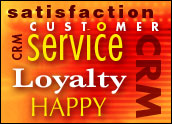
Getting CRM wrong is more common than getting it right, according to a new study released by IBM and titled “Doing CRM right: What it takes to be successful with CRM.” In fact, just 15 percent of companies seem to achieve that goal.
The study, conducted in late 2003 and early 2004 by the IBM Institute for Business Value, part of IBM Business Consulting Services, claims CRM success can be improved as much as 80 percent through better management of “softer” but key CRM approaches and business processes.
Specifically, the survey noted that it is not the big-ticket items — CRM technology, deployment or integration — that are the problem, but rather the human and cultural ones involving employees, business processes, operations and management.
Global View
IBM surveyed 373 senior-level or higher management decision makers or influencers at a mix of small, mid-size and large companies to understand how those companies achieved CRM success and ROI. In geographical terms, the survey included executives at 101 businesses in the Americas; 153 in Europe and the Middle East; and 92 in Asia from a mix of financial services, communications, distribution and industrial companies.
“Thirty-five percent of the interviewees were C-level managers,” Steve LaValle, the IBM Business Consulting Services partner who led the research, told CRM Buyer.
“We were surprised that only 15 percent of companies felt that they are doing CRM correctly,” LaValle added. “But what made them successful was developing a CRM strategy, budgeting process management, process change, governance and change management.”
IBM’s findings are similar to what the Meta Group is seeing, Liz Roche, vice president for technology research services at the analyst firm, told CRM Buyer. She said user issues, lack of executive support and lack of business case are huge problems in many CRM implementations.
Softer Side of CRM
Despite challenges in achieving ROI, many companies are looking to CRM to improve performance and grow their business overall. Approximately 65 to 70 percent of the companies interviewed for the IBM study are seeking to drive CRM revenue growth by improving the customer experience and retention levels, as well as guiding development of new products and services.
However, senior management appears to be relying too heavily on the technological aspects of CRM as a cure-all while frequently downplaying the softer, human and cultural aspects of the equation. Those latter aspects require involving employees in the process of designing and changing CRM activities and simply managing the CRM solution well.
Sheryl Kingstone, program manager at the Yankee Group, told CRM Buyer that companies should envision CRM value as a Venn diagram. In other words, the overlap of technology, business processes and company culture is the critical area to consider, because none of them stands alone.
Attitude Is Everything
IBM’s LaValle noted that management attitude is also a primary determinant of CRM success. Top managers who see CRM as critical tended to be in IBM’s successful 15 percent. But senior managers at more than 35 percent of companies surveyed appeared to impede their firms’ CRM success by portraying it as useful but not critical. This executive perspective diminished CRM success by sending a message to employees and middle management that CRM was not a priority.
“Interestingly, companies that considered CRM as an IT tool also tended to have successful implementations,” LaValle said.
Currently, just 14 percent of employees fully use a CRM solution, the survey pointed out. More than 75 percent of companies fail to fully use their CRM solution, at least in part due to underestimating the importance of “soft” issues. In fact, just 21 percent of IBM interviewees said employee alignment is an important issue for successful CRM initiatives.
Managing CRM
Twenty-five percent of companies participating in the study claim they run CRM from at a corporate level and that the management team typically crosses multiple functions. When CRM is driven from a corporate and cross-functional level, its success rate increases by 25 to 60 percent, claims the IBM study.
Meta Group’s Roche agreed, saying CRM ought to be managed at the enterprise level in a CRM PMO (program management office) to be effective.
Although it’s not big-ticket CRM technology that’s holding up improvements, attacking the other, softer side of CRM isn’t easy. It requires high-level management commitment to train employees on CRM processes, tools and policies and involve them in governing and improving those processes.
“Process [and] culture need to be part of strategy from the beginning,” Paul Greenberg, president of CRM consultancy The 56 Group, told CRM Buyer. “Most companies give lip service to living in a customer ecosystem, but the IBM survey shows that transferring CRM into a company’s culture is very important.”













































